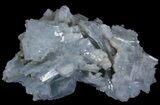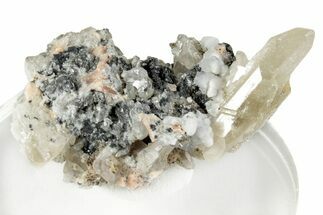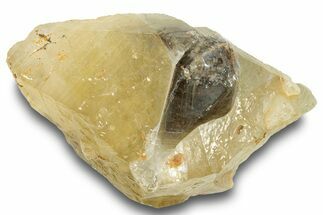This Specimen has been sold.
2.7" Blue Bladed Barite and Quartz Association - Morocco
This specimen contains quartz and bladed blue barite. The quartz formed as druzy aggregations that wrap around the barite. The barite has a blue coloration and a bladed formation.
Barite, commonly spelled baryte, is well-known for its great range of colors and varied crystal forms and habits. = It is a heavy mineral consisting of barium sulfate, and typically has the chemical formula of BaSO4. The barite group consists of baryte, celestine, anglesite, and anhydrite. It is generally white to colorless and is the main source of barium.
About Quartz
Quartz is the name given to silicon dioxide (SiO2) and is the second most abundant mineral in the Earth's crust. Quartz crystals generally grow in silica-rich environments--usually igneous rocks or hydrothermal environments like geothermal waters--at temperatures between 100°C and 450°C, and usually under very high pressure. In either case, crystals will precipitate as temperatures cool, just as ice gradually forms when water freezes. Quartz veins are formed when open fissures are filled with hot water during the closing stages of mountain formation: these veins can be hundreds of millions of years old.
Quartz is the name given to silicon dioxide (SiO2) and is the second most abundant mineral in the Earth's crust. Quartz crystals generally grow in silica-rich environments--usually igneous rocks or hydrothermal environments like geothermal waters--at temperatures between 100°C and 450°C, and usually under very high pressure. In either case, crystals will precipitate as temperatures cool, just as ice gradually forms when water freezes. Quartz veins are formed when open fissures are filled with hot water during the closing stages of mountain formation: these veins can be hundreds of millions of years old.
SPECIES
Quartz & Barite
LOCATION
Bou Nahas Mine, Oumjrane area, Morocco
SIZE
2.7" long, 1.8" wide
CATEGORY
ITEM
#64384
 Reviews
Reviews















